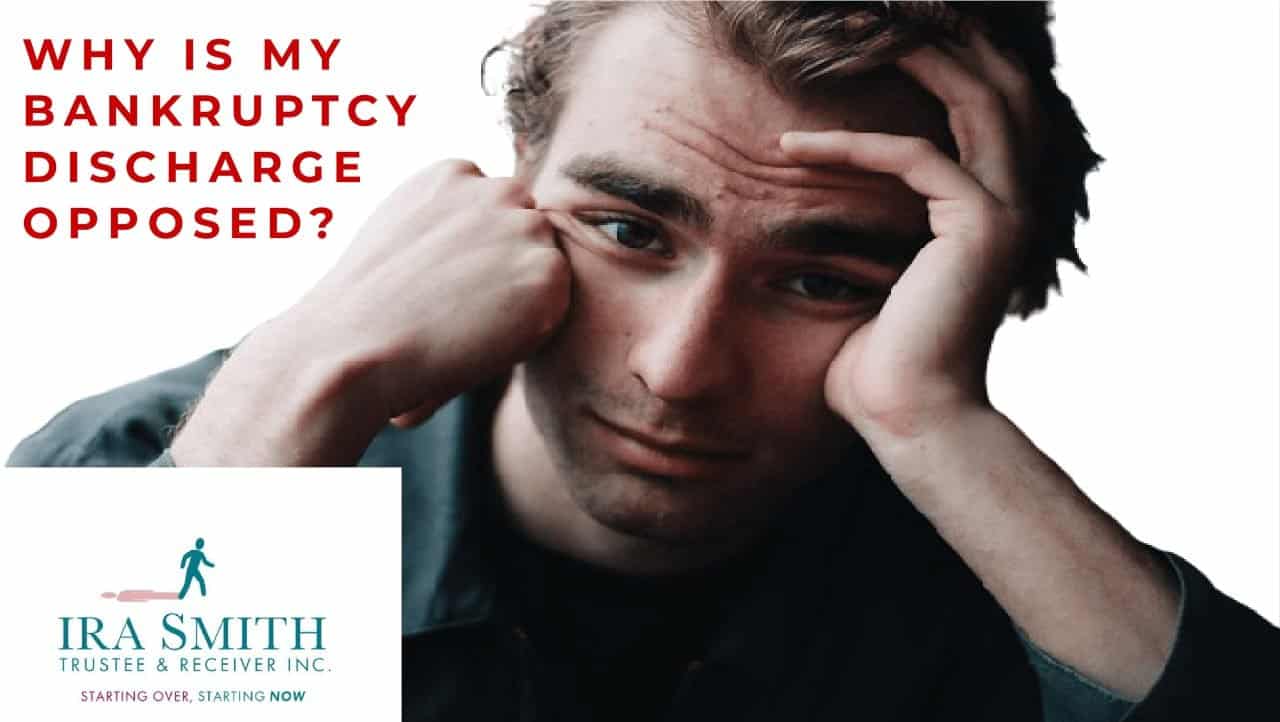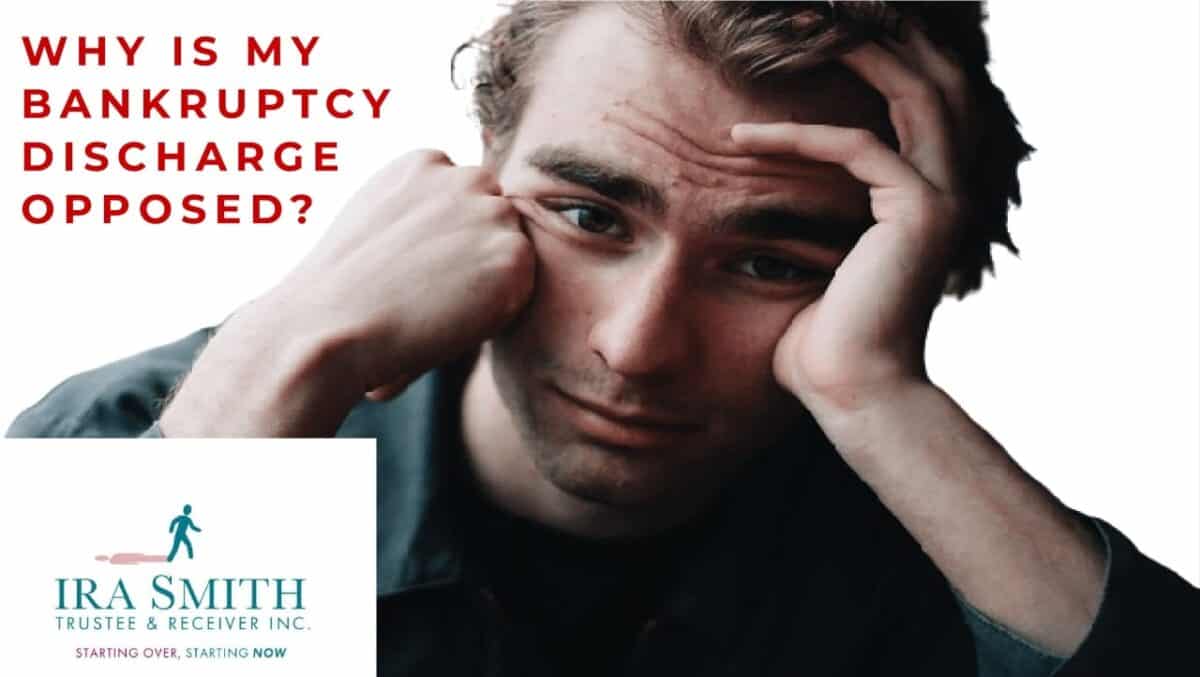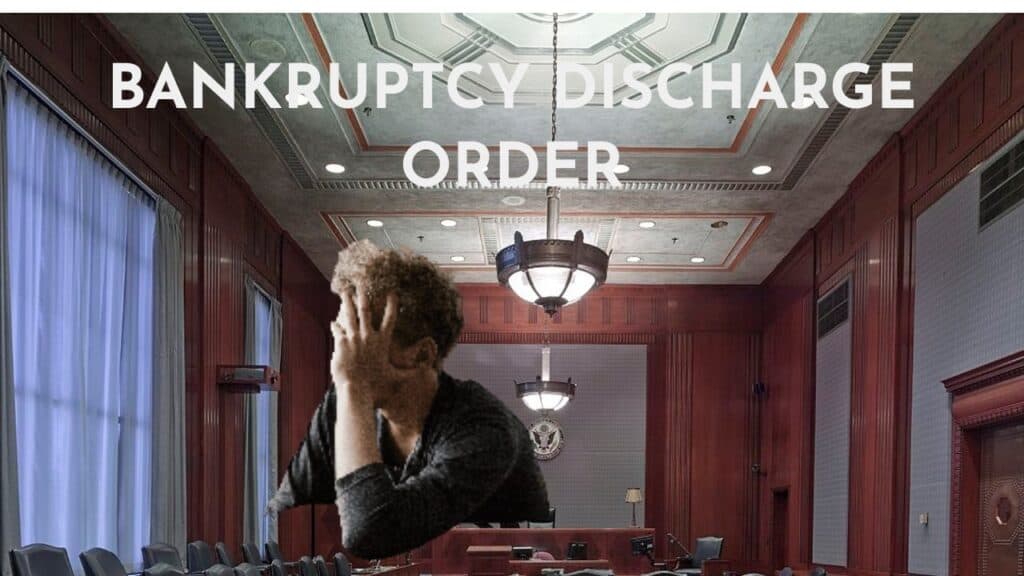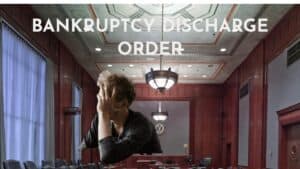Suspension of discharge from bankruptcy: Bankruptcy discharge and what it means for the bankrupt
The implications of an absolute bankruptcy discharge on the debtor are significant. Once an absolute discharge is granted, the debtor is no longer liable for any unsecured debts that existed at the date of bankruptcy. The debtor is released from having to repay any debts that they incurred before filing for bankruptcy.
This means that the debtor no longer has to worry about repaying those debts and can move on with their life. This provides a fresh start for the debtor and helps them get back on their feet.
There are different types of bankruptcy discharges. The one every bankrupt person wants is an absolute discharge. However, sometimes there is a reason for either a creditor, the licensed insolvency trustee (formerly called a trustee in bankruptcy) (Trustee), or both, to oppose a bankrupt person’s discharge. When this happens, there must be a court hearing to determine what form of discharge the bankrupt is entitled to.
The purpose of the discharge hearing is for the court to view the evidence put forward by those opposing an absolute discharge, the bankrupt who believes they are entitled to one and to review the Trustee’s report and gain further information about the conduct of the bankrupt person, both before and during bankruptcy, and to hear about the administration of the bankruptcy.
At the discharge hearing, the court is attempting to balance the right of a bankrupt person to receive a discharge and the rights of the creditors to be paid. The court will also be concerned that the administration of the bankruptcy is not only fair to all parties but is also seen to be fair. I recently came across a decision of the Court of King’s Bench of Alberta which exemplifies this finding of balance.
In this Brandon’s Blog post, I’m discussing what it means when a bankrupt person is discharged, as well as the process and different types of discharges. One type of discharge that a bankrupt person can be given is a suspension of discharge from bankruptcy taking place. I’m also highlighting this recent court decision that demonstrates the balance and fairness that the courts strive for.
Suspension of discharge from bankruptcy: When can a bankrupt person be discharged?
If you have filed for bankruptcy for the first time, you may qualify for an automatic discharge after a 9 month bankruptcy period. To qualify for this automatic discharge, you must have:
- attended the two mandatory financial counselling sessions with the Trustee;
- no requirement to pay surplus income, being a portion of their income is paid to the bankruptcy estate according to guidelines set by the Office of the Superintendent of Bankruptcy (OSB or Official Receiver); and
- no opposition to his or her discharge.
The only party that can authorize an automatic discharge in bankruptcy is the Trustee.
If you have made an assignment in bankruptcy before and so this subsequent bankruptcy is your 2nd bankruptcy, you will need to wait at least 24 months before you can receive a discharge. If you have a surplus income payment requirement, your bankruptcy will be prolonged to 36 months.
If you have filed for bankruptcy twice before, you can expect the timeline for a third bankruptcy to be the same as your 2nd. However, the Trustee or creditors may be more resistant to your discharge this time. The court may extend the timeline if it deems necessary.
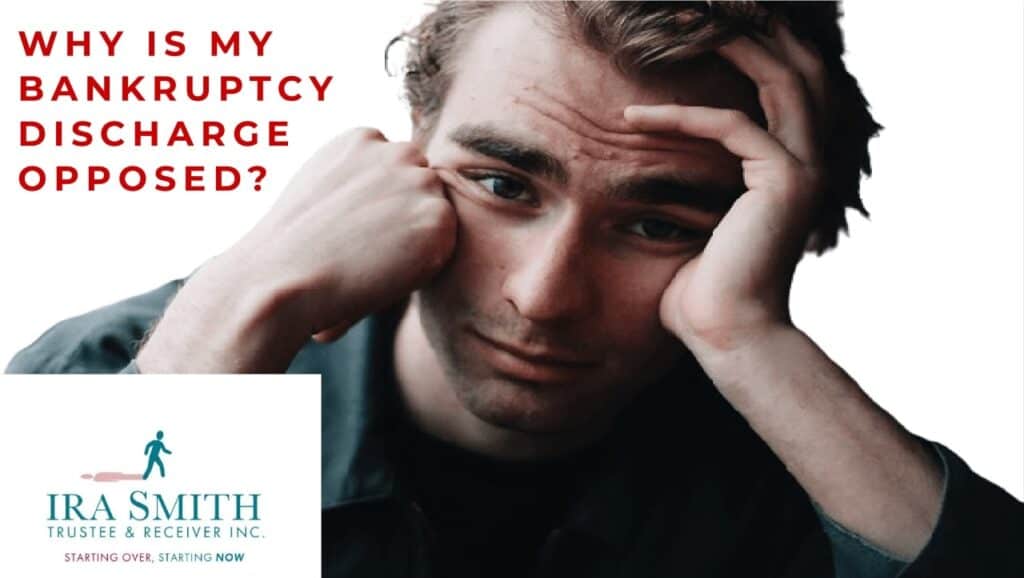
Suspension of discharge from bankruptcy: When is a discharge challenged?
The Trustee may oppose a bankrupt’s discharge by issuing a notice of opposition. This means that the bankrupt did not fulfill all of their duties when the time came for the Trustee to make a determination if the bankrupt is entitled to a discharge.
If one or more creditors oppose the debtor’s bankruptcy discharge, they may believe that additional information is needed to be evaluated by the court in order to determine what kind of discharge, if any, the debtor should receive.
The court will then decide what kind of bankruptcy discharge the bankrupt should receive.
Suspension of discharge from bankruptcy: What are the different types of discharge that can be granted in bankruptcy proceedings?
There are different kinds of discharge from bankruptcy process. They are:
- Absolute discharge: you are entitled to an immediate discharge;
- Conditional discharge: you can obtain a discharge after fulfilling one or more conditions;
- Suspension of discharge from bankruptcy – a suspended discharge from bankruptcy means that the discharge will occur at a later date set by the court, and will be combined with either an absolute bankruptcy discharge or conditional bankruptcy discharge;
- Refused discharge – the court can refuse the bankrupt’s discharge due to unsatisfactory fulfillment of duties and lack of response to the Trustee’s inquiries; or
- “no order” – the Trustee has advised the court that, despite the passage of time, the bankrupt has not fulfilled all of his or her duties, has failed to respond to the Trustee’s requests, and the Trustee wishes to seek its discharge.
The bankrupt’s discharge in bankruptcy occurs when the bankrupt person has fulfilled the conditions set by the court and/or the suspension of discharge from bankruptcy period has ended.
The duration of bankruptcy depends on all of the above factors.

Suspension of discharge from bankruptcy: There are five types of debt that are not dischargeable in bankruptcy
What debts cannot be discharged through bankruptcy? There are 5 types of debts that cannot be discharged. They are:
- alimony or child support payments;
- penalties or fines set by the court;
- claims from fraud or fraudulent breach of trust;
- student loan debt if it is less than 7 years since you stopped being a full-time or part-time student; and
- Any debts that are properly secured by an asset are not released as a result of a bankruptcy discharge.
There are five types of debt that are not discharged in bankruptcy. The debtor will need to continue paying these financial obligations according to their terms. For all other unsecured debts, the discharge from bankruptcy will discharge all those debts.
Suspension of discharge from bankruptcy: The opposed bankruptcy discharge process case
The decision was released on September 29, 2022, in Wasylynuk (Re), 2022 ABKB 650 (CanLII), For me, this Court of King’s Bench of Alberta (it is still going to take me time to get used to the switch from “Queen” to “King”!) by the Registrar in Bankruptcy, epitomizes the balance the court strives to find in bankruptcy discharge situations.
This is an application for a bankrupt’s discharge which is opposed. The bankrupt, Ms. Wasylynuk, has completed all required duties. She is a first-time bankrupt with a surplus income requirement. The bankruptcy was driven by litigation costs when Ms. Wasylynuk unsuccessfully sued her surviving brothers and sisters for a share of her father’s estate.
The bankrupt filed a challenge to her father’s will and the disposition of his property in 2008. This led to 10 years of litigation for a share of the estate. All of the estate had been given to one of her brothers, who was tasked with caring for the father and, after his passing, dividing it as he saw fit. Ms. Wasylynuk rejected her brother’s offer of a share, wanting more.
Prior to her bankruptcy, Ms. Wasylynuk brought an application, presumably based on legal advice she received, to set aside her father’s will and an inter vivos gift made by her father that gave everything to one of her siblings. The will and the gift were both drawn up by lawyers with doctors’ certificates of competence and capacity. The will and the gift were upheld by the lower court. The lower court’s ruling was upheld on appeal. The Supreme Court of Canada refused to hear the case.

Suspension of discharge from bankruptcy: The opposition to bankruptcy discharge and the evidence
The bankrupt’s siblings are the opposing creditors. The opposing creditors dispute Ms. Wasylynuk’s characterization as an honest but unfortunate debtor. Their grounds for opposition are:
- The value of the bankrupt’s assets does not equal fifty cents on the dollar of the bankrupt’s unsecured liabilities, and the bankrupt is responsible for the circumstances that caused this.
- Ms. Wasylynuk has not been able to provide an explanation for the disappearance of assets, or for why there are not enough assets to cover debts.
- She was eligible to make a proposal under the Bankruptcy and Insolvency Act (Canada) (BIA) rather than bringing on this bankruptcy process but did not.
The evidence included the fact that, during the litigation, the bankrupt employed several different law firms and did not pay most of the legal fees she incurred. At the time of her bankruptcy, she owed in excess of $200,000 for unpaid legal fees. In her bankruptcy filing, she claimed $5,500 in assets, consisting of a motor vehicle, furniture, and personal effects, all of which were exempt.
Another bit of evidence was that Ms. Wasylynuk had likewise allowed a charge to be registered against the home in favour of her spouse to support his alleged loans to her of $277,000.00. Mr. Wasylynuk additionally declared an unsecured amount of $152,365.00 for loans to her. There were no documents to validate the amount. The Registrar noted that he was skeptical of these alleged loans as most of the bankrupt’s legal fees were unpaid.
On top of this, 13 months prior to her making her bankruptcy assignment, she transferred her half share of the matrimonial home to her husband. The bankruptcy Trustee did not have the funds to attack the transfer in the current bankruptcy administration.
Ms. Wasylynuk’s siblings’ litigation costs totalled approximately $750,000.00. The costs awarded from the first instance through the appeal will cover less than a third of those costs.
The Registrar calculated that, under Alberta law, the bankrupt’s non-exempt equity in the matrimonial home at the time of transfer to the spouse was approximately $118,000.00.
Suspension of discharge from bankruptcy: The balancing act of the Registrar’s decision
The Registrar took note of the above and made several findings. First was that Ms. Wasylynuk, 59, is a specialized nurse in a teaching position. She makes nearly $60 per hour. She continues to live in her fully encumbered matrimonial home with her husband, which is now out of reach of her creditors.
The Trustee explained that a proposal was ruled out because the litigation between Ms. Wasylynuk and her siblings that led to this bankruptcy was highly acrimonious. The Registrar found that it is unclear whether a proposal would have been doomed to failure because of ill will between the siblings, particularly since a proposal would have resulted in a better result for the creditors than her bankruptcy.
Ms. Wasylynuk has paid $51,000 into the estate over her 21-month bankruptcy. Her monthly surplus is $2,000. At that surplus rate, a 60-month proposal would have achieved $120,000 for her creditors or about the value of her non-exempt portion of the matrimonial home.
So to balance the scales, the Registrar gave Ms. Wasylynuk a conditional discharge. Ms. Wasylynuk’s discharge is conditioned upon her paying an additional $60,000.00 into the bankruptcy estate at the rate of a monthly payment of $2,000.00. By ordering these additional payments, once they are all made, the amount paid into the bankruptcy estate will be roughly equal to the minimum amount she would have paid if she chose to make a proposal over bankruptcy.

Suspension of discharge from bankruptcy: Ready to be debt-free?
I hope that you found this suspension of discharge from bankruptcy Brandon’s Blog informative. If you’re sick and tired of being in debt and ready to live a much better life, we can assist. We know exactly how it really feels to be in debt as well as feel like you’re never going to get ahead. We have actually helped lots of people and businesses that were in your position reach financial stability, so we understand it’s feasible for you to prosper in your objective of ending up being debt-free. Nevertheless, it will certainly require some work on your part. We’ll be right here to assist you with every action necessary.
The financial restructuring process is complex. The Ira Smith Team understands how to do a complex restructuring. However, more importantly, we understand the needs of the entrepreneur or the person who has too many personal unsecured debts, Credit card debt, income tax debt liability, unsecured loans or personal obligations from the running of your company or from being a business owner. These are all types of debt we can help you eliminate. We know that you are worried because you are facing significant financial challenges. Filing bankruptcy is the last option we explore only after we have exhausted all other options to avoid bankruptcy, such as financial restructuring through a debt repayment plan.
It is not your fault that you are in this situation. You have been only shown the old ways that do not work anymore. The Ira Smith Team uses new modern ways to give you the best management advice to get you out of your debt troubles while avoiding bankruptcy. We can get you debt relief freedom.
The stress placed upon you is huge. We understand your pain points. We look at your entire situation and devise a strategy that is as unique as you and your problems; financial and emotional. We know that we can help you the way we take the load off of your shoulders and devise a debt settlement plan.
We realize that people and businesses in financial difficulty need practical advice and a workable solution in an easy-to-understand financial plan. The Ira Smith Team knows that not everyone has to file for bankruptcy in Canada. Most of our clients never do, as we are familiar with alternatives to bankruptcy. We assist many people in finding the relief they need.
Call or email us. We would be happy to give you a no-cost initial consultation. We can find you the perfect solution to tailor a new debt restructuring procedure specifically for you, based on your unique economic situation and needs. We provide a full range of services to people and companies. If any of this sounds familiar to you and you’re serious about finding a solution, let us know. We will get you back to living a happy life, whether or not there is an economic recession in Canada.
Call us now for a no-cost initial consultation. We are licensed professionals.
